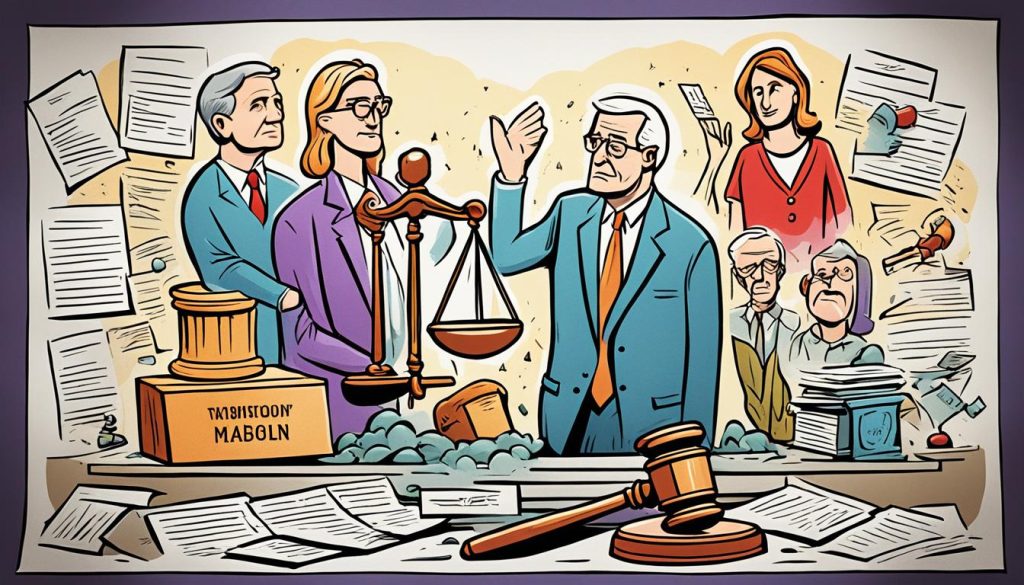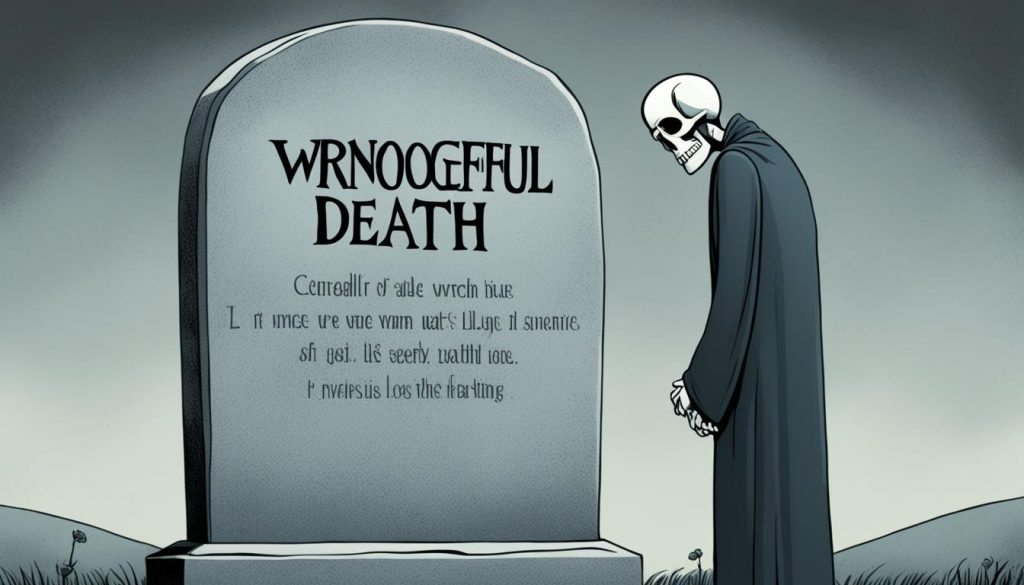When someone dies because of someone else’s mistake or wrong action, their family might file a wrongful death claim1. These claims help cover costs like medical bills, lost income, and the pain the deceased felt before they died1. A family member or the estate’s representative usually files the claim.
Wrongful death claims can come from many fatal accidents, like car wrecks, medical mistakes, or faulty products1. In these lawsuits, the family or the deceased’s estate fights for compensation for their own losses from the death1. They aim to make the responsible party pay and get justice for the victim’s loved ones.
Key Takeaways
- Wrongful death claims offer compensation for the family’s losses, including medical bills, lost wages, and pain and suffering.
- These claims can stem from various fatal incidents, such as car accidents, medical errors, and product flaws.
- Wrongful death lawsuits are brought by the deceased’s family or estate to hold the liable party accountable.
- An experienced wrongful death lawyer is key in proving the claim and getting fair compensation.
- It’s important to follow statutes of limitations and legal rules when filing a wrongful death claim.
What Is a Wrongful Death Claim?
A wrongful death claim is a lawsuit when someone dies because of someone else’s carelessness or on purpose2. These suits are different from criminal cases and aim for money damages for the family or estate of the deceased2. Such claims can come from many fatal events like car crashes, doctor mistakes, faulty products, or crimes234.
Difference Between Wrongful Death and Personal Injury Claims
Wrongful death suits are filed by the family or estate of the dead person, seeking damages for their loss2. Personal injury claims, however, are filed by the injured person themselves2. Also, proving liability in a wrongful death suit is easier than in a criminal case, needing only “preponderance of the evidence”2.
Wrongful Death vs Criminal Cases
Wrongful death claims and criminal cases both come from the same event but have different goals and outcomes2. Criminal cases aim to prove guilt beyond doubt and can lead to jail time2. Wrongful death suits, on the other hand, focus on financial compensation for the family2.
| Criteria | Wrongful Death Claim | Criminal Case |
|---|---|---|
| Burden of Proof | Preponderance of the Evidence | Beyond Reasonable Doubt |
| Potential Outcomes | Financial Compensation | Jail Time, Fines, Penalties |
| Parties Involved | Deceased’s Family/Estate | State/Federal Government |
Knowing the differences between wrongful death claims and other legal actions helps you navigate the complex process of seeking justice and damages after losing someone close234.
Elements of a Wrongful Death Claim
To make a valid wrongful death claim, you must prove four key points: duty of care, negligence, causation, and damages5. These claims often come from things like birth injuries, medical mistakes, car accidents, product flaws, and more5.
Breach of Duty
The person who died had a right to safety from the defendant, but this right was broken5. This could be from ignoring safety rules, not giving proper medical care, or making a place dangerous.
Negligence and Causation
The death was caused by the defendant’s careless actions5. In wrongful death cases, the evidence needed is less than in criminal cases5.
Listing Damages
The death led to costs like medical bills, lost wages, funeral expenses, and the loss of a loved one5. After legal fees are taken off, the insurance pays out the settlement5. The total compensation is the cost of the death plus pain and suffering5.
Proving these points in court often needs strong evidence and might require expert or witness testimony5. Who can sue for wrongful death varies by state, usually it’s family members or those financially supported by the deceased5. It’s wise to get a lawyer for wrongful death cases to help with the evidence and meet the proof needed5.

To win a wrongful death claim, you must prove the defendant’s duty, negligence, cause, and damages carefully.
| Statute of Limitations | Immunity | Duration of Settlement |
|---|---|---|
| In most states, you have two years from the death date to file a wrongful death lawsuit6. | Some government workers and agencies can’t be sued for actions they do on the job6. | Settlements can happen quickly or take years, based on the case’s complexity and negotiations6. |
| Elements of Negligence | Who Can Sue | Types of Wrongful Death Cases |
| To win, you must show the defendant had a duty, broke it, caused the death, and you suffered harm6. | Those who can sue include spouses, parents, kids, and the deceased’s estate6. | Examples of wrongful death cases include car accidents, product defects, slips, falls, construction accidents, and more6. |
Who Can File a wrongful death claims, personal injury, legal process?
When a loved one dies suddenly because of someone else’s mistake, the family might have the right to file a wrongful death claim7. Each state has its own rules for who can sue, so it’s key to talk to a wrongful death lawyer to know what applies in your area.
In Texas, many people can file a wrongful death lawsuit7. This includes spouses, kids, parents, adopted kids, and the estate’s legal representative7. This wide range of eligible claimants helps cover the different ways a death can affect a family.
Remember, there’s a deadline to file a wrongful death lawsuit7. In Texas, you usually have two years from when the person died to make a claim7. If you miss this deadline, you won’t be able to sue, so act quickly.
| Eligible Plaintiffs in Texas Wrongful Death Claims | Statute of Limitations |
|---|---|
|
2 years from the date of death, with some exceptions7 |
If your loved one died because of someone else’s fault, it’s important to know your legal rights7. Talk to a skilled wrongful death lawyer to make sure your family’s rights are looked after and you get the compensation you need7.

Who Can Be Sued for Wrongful Death?
Wrongful death lawsuits can be filed against many people. This includes drivers who are careless, companies that make dangerous products, and people who give alcohol to those who can’t handle it. It also includes companies that don’t warn about product dangers, those who design or build bad roads, and doctors who make mistakes8.
But, some groups like government workers and agencies might not be sued for wrongful death. This is because they often have immunity in workers’ compensation cases8.
Immunity from Wrongful Death Lawsuits
In New York, some government workers and agencies can’t be sued for wrongful death. This makes it harder for families to get compensation if a government worker was at fault89.
Also, employers usually can’t be sued for wrongful death if the person who died was an employee. The family must file a claim through workers’ compensation instead8.
Finding your way through wrongful death claims and figuring out who can’t be sued can be tough. It’s key to get help from a skilled personal injury lawyer. They can guide you on your legal path and help you get the compensation you need89.
The legal system tries to help families get compensation when someone dies because of someone else’s mistake. But, defendants, insurance companies, and lawyers often try to protect their own interests. This can make the legal fight for wrongful death claims very tough for families8.
Remember, lawyers for wrongful death claims usually work for a fee based on the outcome. This means they don’t get paid unless you win your case. They also offer free consultations to talk about your legal rights8.
Filing a Wrongful Death Lawsuit
Filing a wrongful death lawsuit has many important steps. First, you need to file legal documents like a complaint or petition. This tells the defendant about the case and its legal reasons. You also need a summons document10.
You must prove the wrongful death claim and gather evidence of damages10.
Remember, there’s a time limit to file the lawsuit, known as the statute of limitations. This varies by state, from one year to ten years11. It’s wise to talk to a wrongful death lawyer to follow your state’s rules10.
| State | Statute of Limitations |
|---|---|
| Georgia | 2 years from the date of death |
| Illinois | 1-2 years from the date of death |
| California | 2 years from the date of death |
In some places, only the executor of the estate can file a wrongful death lawsuit11. But in other states, family members like spouses, children, siblings, parents, and others can file11.
Working with a skilled wrongful death lawyer is key. They help with filing, getting the right compensation, and following state laws10. They can handle many tasks, like filing complaints, gathering evidence, and negotiating with insurance companies11.
Proving and Winning a Wrongful Death Case
To win a wrongful death lawsuit, you must prove four key things: duty of care, breach of duty, causation, and damages12. You need strong evidence and witness stories to show the judge or jury that a wrongful death happened and caused big damages1314.
First, show the defendant had a duty to prevent harm. This could be a doctor or driver who should have acted carefully14. Then, prove they didn’t meet that duty, like through careless actions or intentional harm1314.
Showing the link between the defendant’s actions and the victim’s death is hard. You’ll need expert opinions, medical records, or other proof to connect the dots1412.
Lastly, figure out the damages the plaintiff faced, like funeral costs, lost wages, and emotional pain12. This part can be tricky, but it’s key to show the full effect of the wrongful death14.
The defendant might argue the lawsuit is too late, they didn’t owe a duty, they acted in self-defense, they weren’t at fault, or their actions weren’t the main cause of death1314.
Winning a wrongful death case takes a deep understanding of the law and a strong case presentation14. With a skilled personal injury lawyer, you can better navigate the legal process and aim for the right compensation12.
“Wrongful death lawsuits seek compensation for a person’s death due to someone else’s negligence or intentional harm.”
To prove and win a wrongful death case, gather all the evidence you can, create a solid legal plan, and work with your lawyer to understand the legal steps131412.
Conclusion
Wrongful death claims help families of those who died from another’s mistake or bad act15. These claims aim to get money for medical bills, funeral costs, lost earnings, and emotional pain15. It’s a tough legal process, but a skilled wrongful death lawyer can guide you and help you get justice15.
Filing a wrongful death claim makes the responsible person answer for their actions15. You can get money for both financial and emotional losses15. Experts like economists and CPAs are key in figuring out the full cost of the loss16.
Going after a wrongful death claim is not just about money. It’s about making sure the actions that caused your loved one’s death are held accountable16. With the right legal team, you can go through the legal steps and aim for what’s best for your family and your loved one’s memory15.
FAQ
What is a wrongful death claim?
A wrongful death claim is a lawsuit filed by those who lost someone due to someone else’s mistake or bad actions. It aims to get money for things like medical bills, lost income, and the loss of a loved one.
How is a wrongful death claim different from a personal injury claim or a criminal case?
Wrongful death claims are about getting money for a death caused by someone else. Criminal cases aim to punish the person who did it. Personal injury claims are for the person hurt, not the ones left behind.
What are the key elements of a wrongful death claim?
To win, you must show: 1) The defendant had a duty to the deceased, 2) They didn’t meet that duty, 3) Their failure led to the death, and 4) The claimants suffered because of the death.
Who can file a wrongful death claim?
Usually, the spouse of the deceased starts the claim. If there’s no spouse, it can be filed by the children, parents, or someone who represents the estate.
Who can be sued in a wrongful death lawsuit?
Lawsuits can be against many, like careless drivers, makers of faulty products, those who give alcohol to drunk people, or doctors who make mistakes. But, some government groups and employers might not be sued.
What is the process for filing a wrongful death lawsuit?
First, you must file legal papers like a complaint and summons. Then, you need to prove your case and show the damages. Remember, there’s a deadline to file your claim in most states.
How can you prove and win a wrongful death case?
To win, gather evidence and witness stories that show the defendant was at fault, their fault caused the death, and you suffered losses. The other side might argue they weren’t wrong or that you missed the deadline.

